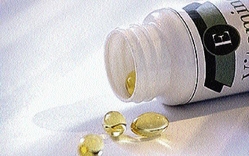
Nowadays there is heightened consciousness worldwide that vitamin supplementation is essential. The good old-fashioned balanced diet sometimes takes a back-seat. The subject of vitamin dosage (how much is too much) and recommended daily allowances to maintain health, has aroused popular scientific debate.
Consuming vitamin-rich foods as part of a balanced diet is ideal for the body. However, to consume supplements plus a not-so-balanced diet is more practical for many because of limited finances or lack of time to prepare meals.
Handle with care
Supplements have side effects, may be toxic in high doses and may interact with medication. Before supplementing our diet, we should consult our pharmacist or physician.
Too little is as harmful as too much
Vitamins are essential to health, and deficiencies can cause severe problems. However, the amount of any vitamin we take should be based on our personal requirements. Too little is as harmful as too much. The quantity of vitamins taken for daily health maintenance is different (less) from that which is taken to correct or overcome specific deficiency disorders.
Diseases of the intestines which affect absorption of vitamins are common reasons for vitamin deficiencies in some people. In the case of vitamin A, long-term use of alcohol and use of the laxative, mineral oil, may lead to its depletion. Let's look at vitamin A deficiency and the recommended daily allowances for health maintenance.
Vitamin A
Vitamin A (and beta-carotene, a form of pre-vitamin A which gets converted to vitamin A in the body) is versatile. It has a role in eye-sight, immune defences, maintenance of body linings and skin, bone growth, and cell development.
It also helps form and maintain teeth. If we do not consume enough vitamin A-rich foods like liver, egg-yolks, salt-water fish, milk, pumpkin, garlic, carrots and yellow and orange fruits, we may benefit from taking Vitamin A supplements.
Good old cod liver oil, Scott's emulsion, vitamin-A capsules or multivitamin supplements are great choices. Approximately 200 international units (IU) daily is sufficient for babies, 2,000 IU for small children and 2,500 IU for normal adults.
Deficiency of vitamin A
Deficiency of vitamin A is apparent if there is dry, rough skin, vision problems like night blindness (difficulty seeing in dim light), xerophthalmia (dry eyes), and abscesses in the ears. Deficiency is often treated by injection of vitamin A.
Take home messages
The right dose of vitamin A differentiates it from being a remedy or a poison.
It is best to get vitamin A from foods.
If you're taking a multivitamin, you probably won't need to take additional vitamin A supplements.
Before you start to take supplements with this or any vitamin, consult a pharmacist or physician, especially if you have liver disease or drink too much alcohol, if you are pregnant or of childbearing age, (high doses of vitamin A are potentially harmful to the baby), or if you take medicines.
Dahlia McDaniel is a pharmacist and final year doctoral candidate in public health at the University of London; email: yourhealth@gleanerjm.com.
